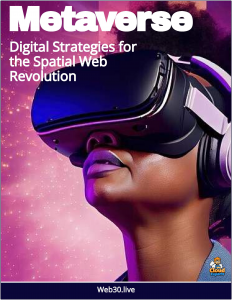How the Metaverse Will Transform Society and Business
The Metaverse is a collective virtual shared space, created by the convergence of physical and virtual reality, where users can engage with each other and digital objects in real-time.
 The metaverse—a convergence of virtual reality (VR), augmented reality (AR), blockchain, AI, and persistent digital worlds—promises to transform society and business in profound ways.
The metaverse—a convergence of virtual reality (VR), augmented reality (AR), blockchain, AI, and persistent digital worlds—promises to transform society and business in profound ways.
While its full realization remains years away, its trajectory, as envisioned by figures like Zuckerberg, Stephenson, and Walsh, suggests a radical reshaping of human interaction, economic systems, and cultural norms.
Transformation of Society
The metaverse will shift socialization from flat, screen-based exchanges to immersive, 3D experiences where presence feels tangible. Imagine attending a concert with friends from across the globe, feeling their avatars’ energy, or hosting family gatherings in a virtual space that mimics a childhood home.
This could deepen connections across distances but risks eroding physical-world intimacy—face-to-face nuances like smell or touch might fade, potentially isolating those who opt out. Social hierarchies could also shift, with status tied to digital assets (e.g., rare NFT avatars) rather than physical wealth, amplifying new forms of inclusion and exclusion.
Blurring of Reality and Identity
As people spend more time in customizable virtual worlds, the metaverse could blur the lines between physical and digital identities. Avatars might let users explore fluid genders, species, or entirely abstract forms, fostering empathy and self-expression but also raising questions about authenticity. A society where “real” identity is optional might see reduced prejudice (e.g., less focus on race or disability) or new conflicts over digital misrepresentation. Mental health could swing both ways: escapism might soothe some, while others grapple with dissociation or addiction to curated realities.
Education and Skill Development
Learning could become experiential and borderless. Picture students dissecting virtual frogs in biology class or practicing public speaking in front of AI-generated crowds—all within a metaverse classroom accessible from a rural village.
This democratizes education, breaking geographic and economic barriers, but it might widen gaps for those without tech access. Socially, it could produce a generation fluent in simulation-based problem-solving, shifting cultural values toward adaptability over rote knowledge.
Cultural Evolution and Fragmentation
The metaverse will spawn micro-cultures—virtual communities with their own norms, art, and economies. A sci-fi fan might live in a Star Wars-inspired world, while a minimalist thrives in a Zen garden simulation.
This hyper-personalization could enrich creativity and diversity but fragment shared cultural touchstones, weakening collective narratives. Global events (e.g., a metaverse Olympics) might counter this, uniting millions in shared virtual spectacles, though they’d compete with physical traditions.
Governance and Ethics
A decentralized metaverse (like Stephenson’s vision) could challenge traditional governance. Virtual worlds might adopt DAOs (decentralized autonomous organizations) for self-rule, reducing reliance on nation-states but complicating accountability—think virtual crime with no clear jurisdiction.
Privacy will erode as every move is tracked, yet blockchain could empower users to own their data. Society might split between metaverse natives, comfortable in surveillance, and skeptics clinging to analog life.
Transformation of Business
The metaverse will birth a digital-first economy. Virtual goods—NFT skins, land, or experiences—could rival physical markets, with creators selling directly to users via smart contracts.
Companies like Meta aim for “hundreds of billions” in commerce; imagine Nike selling AR sneakers that “walk” in both worlds or architects designing virtual offices for remote teams. Traditional firms might shrink as metaverse-native startups thrive, though scams (e.g., fake NFT drops) could destabilize trust.
Workplace Revolution
Remote work will evolve into hybrid virtual offices. Horizon Workrooms or successors could host meetings where avatars brainstorm in 3D, cutting travel costs and carbon footprints. Businesses might save on real estate, but they’ll invest heavily in VR/AR tech and training.
Productivity could soar with AI assistants managing tasks, yet employee burnout might rise if work bleeds into personal virtual spaces. Hiring could globalize further, favoring skills over location, though digital divides might exclude some regions.
Marketing and Customer Engagement
Brands will shift from ads to experiences. A car company might let you test-drive a virtual Porsche across a Martian landscape, or a fashion label could host AR runway shows in your living room. Engagement will hinge on immersion—think gamified loyalty programs or co-created products with fans.
Data from these interactions will sharpen targeting, but privacy backlash could push businesses toward transparent, user-owned data models (e.g., Web3).
Supply Chains and Digital Twins
Businesses will use metaverse “digital twins”—virtual replicas of factories, stores, or cities—to optimize operations. A retailer could simulate foot traffic in a virtual mall, tweaking layouts in real time, or a manufacturer could test machinery in VR before building it. This cuts costs and speeds innovation, but it demands massive computing power and could widen gaps between tech-rich and tech-poor firms.
Disruption of Traditional Industries
Legacy sectors will face upheaval. Real estate might pivot to virtual land (e.g., Decentraland plots), challenging physical property values. Entertainment could see Hollywood replaced by user-generated VR films, while retail shifts to “try-before-you-buy” AR showrooms. Laggards risk obsolescence, but pioneers might over-invest in unproven tech, as Meta’s $40+ billion Reality Labs losses suggest.
Broader Implications
The metaverse’s societal impact hinges on accessibility. If it’s open and device-agnostic (per Stephenson and Walsh), it could level playing fields; if gated by hardware or corporate control (Zuckerberg’s risk), it might deepen inequality.
Businesses that adapt—embracing AI, blockchain, and spatial computing—will lead, while those that don’t could fade. Culturally, we might see a “metaverse generation” emerge by the 2030s, fluent in hybrid realities but potentially detached from physical roots.
In short, the metaverse could transform society into a more connected, fragmented, and experiential entity, while remaking business into a digital-first, immersive ecosystem. Its success depends on balancing innovation with equity—and avoiding the dystopian pitfalls its sci-fi origins warn against.



